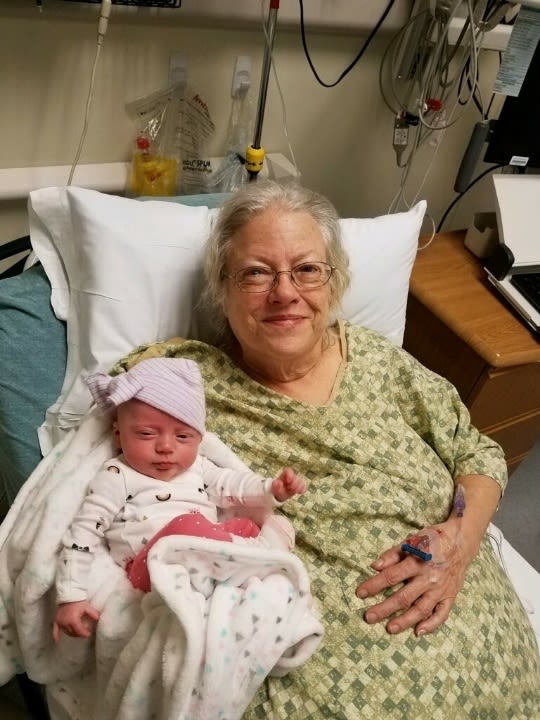A Support System for Healing

Marcia Hazlewood gets a very special visitor after parathyroid surgery in February 2019: her granddaughter, who had been born prematurely in November and spent four weeks in the NICU.
Image: Courtesy Kaiser Permanente
For most people, facing the reality of heart surgery is daunting enough. Facing heart surgery during a pandemic brings even more challenges.
Marcia Hazlewood is no stranger to surgery. Over the years, the retired teacher had survived numerous health problems, including two bouts with breast cancer and 10 surgeries—during open-heart surgery, two heart valves were replaced with bovine valves. Still, when her doctor told her a routine electrocardiogram indicated that the aortic valve she’d had replaced 15 years prior was failing, she was concerned.
She was in good hands working with the team at Kaiser Permanente Sunnyside Medical Center, the highest-rated cardiac program for three common heart surgeries in Oregon and Washington.* However, COVID-19-related precautions at the hospital restricted family members from joining her in her post-op room, and Marcia thought she’d have to go it alone.
Thanks to innovative, patient-focused care, as well as her faith in God, she was not worried.
Her surgeon determined that she was a good candidate for TAVR (transcatheter aortic valve replacement) surgery, a minimally invasive procedure in which a new valve is placed using a catheter threaded through the patient’s leg into their heart. The TAVR procedure has many benefits compared with open-heart surgery, including smaller scars, lower risk of infection, and quicker recovery. It also meant Marcia would be out of the hospital after a day or two.
Her surgery in June went smoothly. “Within hours, I was up walking,” says Marcia. “It was wonderful; I walked around the hall and waved at people and thought, I can do this.” As she recovered in the ICU, she had a nurse with her nonstop. “I was amazed that I had somebody there all the time,” says Marcia. “That to me was very comforting.”
Navigating care and a web of services
Of course, recovery after heart surgery doesn’t end when you leave the hospital. Patients must navigate new medications, aftercare, and lifestyle changes. And amid COVID-19, social outlets and support systems are often not there. For Marcia, that meant not spending time at her church, volunteering, and helping care for her baby granddaughter.
“We know that there’s isolation because people are not supposed to be socializing. Especially when they have a heart issue, the isolation is crippling,” says Allison Lipnick, a clinical social worker for cardiovascular services with Kaiser Permanente who worked with Marcia after surgery.
Cardiac patients are often paired with a social worker like Allison, who can help them access Kaiser Permanente’s web of services and navigate an array of issues, from logistics like employment and insurance changes, shifts in policy, and life care planning to coping with the emotional aspects of chronic disease. For Marcia, it was particularly helpful to have Allison call and check in on her each week, reminding her to do regular blood pressure checks and encouraging her to get up and out of the house, whether that meant going for a short walk or simply reading a book in the sunshine.
“We meet the patient where they’re at: that’s one of our core tenets,” says Allison. “Every situation is unique, and I’m here to help patients choose their path.”
Innovation through remote care
An innovative service now available to Kaiser Permanente’s cardiac patients is the virtual cardiac rehabilitation program. Through this program, which launched in 2019 and continues to evolve, patients are given a fitness device, such as a Fitbit, that monitors their movement. They input data, such as blood pressure, diet, and exercise markers, so their nurse case manager can see improvements and decide next steps. New this year is an educational program involving virtual group classes done over video chat. Discussion themes cover diet, exercise, and the emotions related to illness.
“This allows patients to connect,” says Allison. “A lot of times, our patients are learning from each other and staying motivated because of each other.”
These virtual programs have helped to be a lifeline during the COVID-19 pandemic, but they will continue long after the virus is behind us. Virtual programs help open new opportunities for health maintenance for people who lack easy access to transportation, live far from medical facilities, or have limited ability to get away from home or work.
“The virtual program is a huge benefit to patients’ quality of life,” says Allison. “It allows a greater continuity of care no matter their circumstances.”
Looking ahead, Marcia looks forward to joining more virtual sessions and plans to enroll in an exercise program. She is comforted by her faith and by support from friends and fellow church members. And she knows her social worker will help her navigate any new obstacles. “I know that if I need to talk to somebody, I can call her,” says Marcia. “Having Allison’s number in my phone is such a blessing.”
Learn more about Kaiser Permanente’s heart program at kp.org/cardiac/nw.
*Based on performance for adult heart bypass, aortic, and mitral valve replacement surgeries. Analysis of national data covering the period from January 2016 through December 2019.




